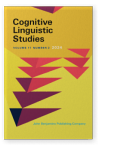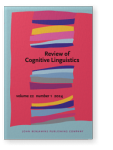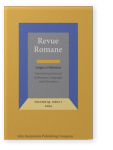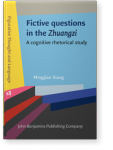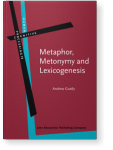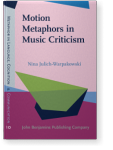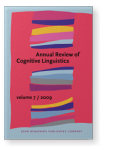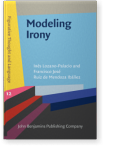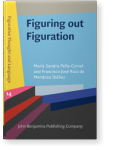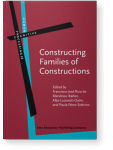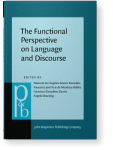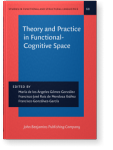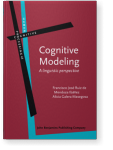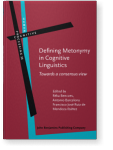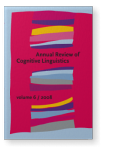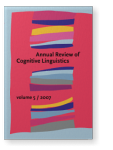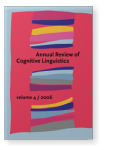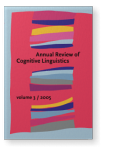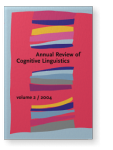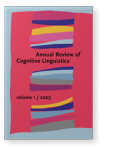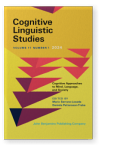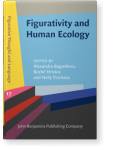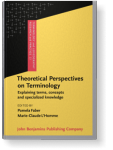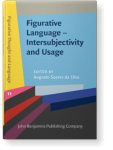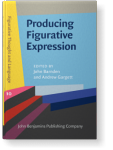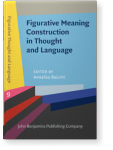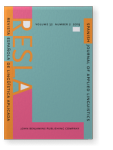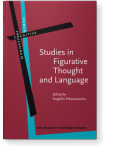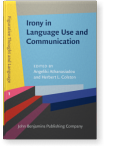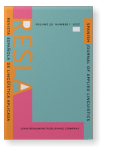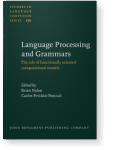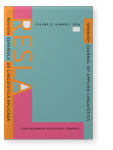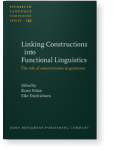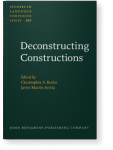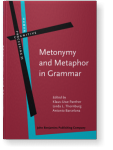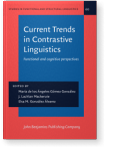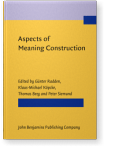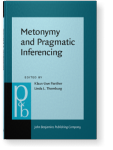Francisco José Ruiz de Mendoza Ibáñez
List of John Benjamins publications for which Francisco José Ruiz de Mendoza Ibáñez plays a role.
Journals
ISSN 1877-9751 | E-ISSN 1877-976X
ISSN 0035-3906 | E-ISSN 1600-0811
Book series
ISSN 2405-6944
Online Resource
Yearbook
ISSN 1572-0268 | E-ISSN 1572-0276
Modeling Irony: A cognitive-pragmatic account
Inés Lozano-Palacio and Francisco José Ruiz de Mendoza Ibáñez
[Figurative Thought and Language, 12] 2022. ix, 173 pp.
Subjects Cognition and language | Discourse studies | Pragmatics | Theoretical linguistics
Figuring out Figuration: A cognitive linguistic account
María Sandra Peña-Cervel and Francisco José Ruiz de Mendoza Ibáñez
[Figurative Thought and Language, 14] 2022. ix, 296 pp.
Subjects Cognition and language | Cognitive linguistics | Pragmatics | Theoretical linguistics
Constructing Families of Constructions: Analytical perspectives and theoretical challenges
Edited by Francisco José Ruiz de Mendoza Ibáñez, Alba Luzondo Oyón and Paula Pérez-Sobrino
[Human Cognitive Processing, 58] 2017. vii, 342 pp.
Subjects Cognition and language | Syntax | Theoretical linguistics
The Functional Perspective on Language and Discourse: Applications and implications
Edited by María de los Ángeles Gómez González, Francisco José Ruiz de Mendoza Ibáñez, Francisco Gonzálvez-García and Angela Downing
[Pragmatics & Beyond New Series, 247] 2014. viii, 292 pp.
Subjects Discourse studies | Functional linguistics | Pragmatics | Theoretical linguistics
Theory and Practice in Functional-Cognitive Space
Edited by María de los Ángeles Gómez González, Francisco José Ruiz de Mendoza Ibáñez and Francisco Gonzálvez-García
[Studies in Functional and Structural Linguistics, 68] 2014. vi, 327 pp.
Subjects Cognitive linguistics | Functional linguistics | Generative linguistics | Theoretical linguistics
Cognitive Modeling: A linguistic perspective
Francisco José Ruiz de Mendoza Ibáñez and Alicia Galera Masegosa
[Human Cognitive Processing, 45] 2014. ix, 250 pp.
Subjects Cognition and language | Cognitive linguistics | Semantics | Syntax | Theoretical linguistics
Defining Metonymy in Cognitive Linguistics: Towards a consensus view
Edited by Réka Benczes, Antonio Barcelona and Francisco José Ruiz de Mendoza Ibáñez
[Human Cognitive Processing, 28] 2011. viii, 284 pp.
Subjects Cognition and language | Cognitive linguistics
Annual Review of Cognitive Linguistics: Volume 7
Edited by Francisco José Ruiz de Mendoza Ibáñez
[Annual Review of Cognitive Linguistics, 7] 2009. iv, 356 pp.
Subjects Cognition and language | Cognitive linguistics
Annual Review of Cognitive Linguistics: Volume 6
Edited by Francisco José Ruiz de Mendoza Ibáñez
[Annual Review of Cognitive Linguistics, 6] 2008. 366 pp.
Subjects Cognition and language | Cognitive linguistics
Annual Review of Cognitive Linguistics: Volume 5
Edited by Francisco José Ruiz de Mendoza Ibáñez
[Annual Review of Cognitive Linguistics, 5] 2007. iv, 334 pp.
Subjects Cognition and language | Cognitive linguistics
Annual Review of Cognitive Linguistics: Volume 4
Edited by Francisco José Ruiz de Mendoza Ibáñez
[Annual Review of Cognitive Linguistics, 4] 2006. iv, 288 pp.
Subjects Cognition and language | Cognitive linguistics
Bibliography of Metaphor and Metonymy
Edited by Antonio Barcelona and Francisco José Ruiz de Mendoza Ibáñez
[Online Resources Collection, MetBib] 2005. ca. 10.000 records
Subjects Cognition and language | Cognitive linguistics | Discourse studies | Pragmatics | Semantics
Annual Review of Cognitive Linguistics: Volume 3
Edited by Francisco José Ruiz de Mendoza Ibáñez
[Annual Review of Cognitive Linguistics, 3] 2005. 360 pp.
Subjects Cognition and language | Cognitive linguistics
Annual Review of Cognitive Linguistics: Volume 2
Edited by Francisco José Ruiz de Mendoza Ibáñez
[Annual Review of Cognitive Linguistics, 2] 2004. iv, 355 pp.
Subjects Cognition and language | Cognitive linguistics
Annual Review of Cognitive Linguistics: Volume 1
Edited by Francisco José Ruiz de Mendoza Ibáñez
[Annual Review of Cognitive Linguistics, 1] 2003. iv, 289 pp.
Subjects Cognition and language | Cognitive linguistics
2024 Metaphor as a resemblance phenomenon: A re-examination of the role of similarity in conceptual metaphor Cognitive Approaches to Mind, Language, and Society: Theory and description, Serrano-Losada, Mario and Daniela Pettersson-Traba (eds.), pp. 8–33 | Article
Conceptual Metaphor Theory (CMT) departed from tradition in metaphor studies by treating this phenomenon as an ordinary one used in everyday reasoning. From its inception, this theory made emphasis on the role of experiential correlation in accounting for metaphorical thought to the detriment of… read more
2022 Linguistic and metalinguistic resemblance Figurativity and Human Ecology, Bagasheva, Alexandra, Bozhil Hristov and Nelly Tincheva (eds.), pp. 15–41 | Chapter
Similarity judgments are fundamental to cognition. They are part and parcel of our ability as humans to deal with the world around us. This ability shows in how we structure and use language. In this context, this chapter addresses the role of perceived similarity, or resemblance, in language… read more
2022 Chapter 17. Conceptual metaphors Theoretical Perspectives on Terminology: Explaining terms, concepts and specialized knowledge, Faber, Pamela and Marie-Claude L'Homme (eds.), pp. 377–396 | Chapter
This chapter offers an overview of conceptual metaphor research with particular attention to specialised language. It surveys the growing body of research showing the role of metaphor both as a tool to generate and develop scientific thinking and as a resource for specialised knowledge… read more
2021 On verbal and situational irony: Towards a unified approach Figurative Language – Intersubjectivity and Usage, Soares da Silva, Augusto (ed.), pp. 213–240 | Chapter
This chapter treats the notion of ironic echo as subsidiary to the broader notion of epistemic scenario, which applies to both verbal and situational irony. In verbal irony, the existence of an epistemic scenario takes the shape of a pretended agreement with someone’s beliefs, which can be… read more
2020 Figurative language: Relations and constraints Producing Figurative Expression: Theoretical, experimental and practical perspectives, Barnden, John and Andrew Gargett (eds.), pp. 469–510 | Chapter
The present paper discusses two aspects of the production of figures of speech. The first one is their relatedness, which is established on the basis of an analysis of their cognitive configuration in terms of combinations of cognitive operations. Such operations are applied to the creation of… read more
2020 The metonymic exploitation of descriptive, attitudinal, and regulatory scenarios in meaning making Figurative Meaning Construction in Thought and Language, Baicchi, Annalisa (ed.), pp. 283–308 | Chapter
This chapter accounts for the different outcomes resulting from the exploitation of different kinds of situational cognitive models (scenarios). Starting from Ruiz de Mendoza and Galera’s (2014) taxonomy of cognitive models, we take a step further by subdividing scenarios into descriptive,… read more
2019 On the cognitive grounding of agent-deprofiling constructions as a case of pretense constructions Revista Española de Lingüística Aplicada/Spanish Journal of Applied Linguistics 32:2, pp. 573–589 | Article
Agent-deprofiling constructions have the function of drawing the language user’s attention to the non-agentive elements of a predication, while endowing one of these elements with agent-like qualities. Members of this family are the inchoative, middle, instrument-subject, location-subject, and… read more
2017 Chapter 2. Construing and constructing hyperbole Studies in Figurative Thought and Language, Athanasiadou, Angeliki (ed.), pp. 42–73 | Chapter
Hyperbole has received little attention in Cognitive Linguistics, while studies within psychology and pragmatics leave aside its representational aspects. To fill this gap, this chapter looks into linguistic evidence of the cognitive operations that underlie its communicative… read more
2017 Chapter 8. Cognitive modeling and irony Irony in Language Use and Communication, Athanasiadou, Angeliki and Herbert L. Colston (eds.), pp. 179–200 | Chapter
This chapter studies the role of the pragmatic notion of echo in creating ironic meaning. The notion of echo is treated as a cognitive operation rather than just a pragmatic task, which combines with other cognitive operations of at least two kinds: concept-building and inferential. The former… read more
2017 Conceptual complexes in cognitive modeling Revista Española de Lingüística Aplicada/Spanish Journal of Applied Linguistics 30:1, pp. 299–324 | Article
The present paper goes beyond previous treatments of cognitive models, especially conceptual metaphor and metonymy, by drawing on linguistic evidence. It introduces needed refinements into previous meaning construction accounts by investigating the activity of conceptual complexes, i.e.,… read more
2017 Introduction: Investigating the constructicon Constructing Families of Constructions: Analytical perspectives and theoretical challenges, Ruiz de Mendoza Ibáñez, Francisco José, Alba Luzondo Oyón and Paula Pérez-Sobrino (eds.), pp. 1–13 | Chapter
2014 Introduction. Plotting functional-cognitive space Theory and Practice in Functional-Cognitive Space, Gómez González, María de los Ángeles, Francisco José Ruiz de Mendoza Ibáñez and Francisco Gonzálvez-García (eds.), pp. 1–30 | Article
2014 On the relatedness of functionalism and pragmatics The Functional Perspective on Language and Discourse: Applications and implications, Gómez González, María de los Ángeles, Francisco José Ruiz de Mendoza Ibáñez, Francisco Gonzálvez-García and Angela Downing (eds.), pp. 1–16 | Article
2014 Low-level situational cognitive models within the Lexical Constructional Model and their computational implementation in FunGramKB Language Processing and Grammars: The role of functionally oriented computational models, Nolan, Brian and Carlos Periñán-Pascual (eds.), pp. 367–390 | Article
This paper investigates the notion of low-level situational cognitive model, its role in linguistic description and its possible computational treatment in the knowledge base FunGramKB. Low-level situational models are exploited metonymically to produce situation-based implicatures. When such… read more
2014 Mapping concepts: Understanding figurative thought from a cognitive-linguistic perspective Revista Española de Lingüística Aplicada/Spanish Journal of Applied Linguistics 27:1, pp. 187–207 | Article
The notion of “conceptual mapping”, as a set of correspondences between conceptual domains, was popularized in Cognitive Semantics, following seminal work by Lakoff & Johnson (1980), as a way of accounting for the basic cognitive activity underlying metaphor and metonymy. Strangely enough,… read more
2014 Constructing discourse and discourse constructions Theory and Practice in Functional-Cognitive Space, Gómez González, María de los Ángeles, Francisco José Ruiz de Mendoza Ibáñez and Francisco Gonzálvez-García (eds.), pp. 295–314 | Article
In line with previous work on the Lexical Constructional Model or LCM(Ruiz de Mendoza & Mairal, 2008; Ruiz de Mendoza, 2013), the present paperpostulates the existence of fixed form-meaning pairings, or constructions, atdiscourse level. The paper first argues that discourse relations such as… read more
2013 Meaning construction, meaning interpretation and formal expression in the Lexical Constructional Model Linking Constructions into Functional Linguistics: The role of constructions in grammar, Nolan, Brian and Elke Diedrichsen (eds.), pp. 231–270 | Article
This paper discusses how the Lexical Constructional Model (LCM) contributes to our understanding of meaning is constructed, interpreted and expressed. It especially addresses the role of constructional meaning in this complex process, while making critical revisions of other constructionist… read more
2011 Introduction Defining Metonymy in Cognitive Linguistics: Towards a consensus view, Benczes, Réka, Antonio Barcelona and Francisco José Ruiz de Mendoza Ibáñez (eds.), pp. 1–6 | Miscellaneous
2011 Metonymy and cognitive operations Defining Metonymy in Cognitive Linguistics: Towards a consensus view, Benczes, Réka, Antonio Barcelona and Francisco José Ruiz de Mendoza Ibáñez (eds.), pp. 103–124 | Article
This chapter begins with a distinction made in Ruiz de Mendoza and Peña (2005) between two broad kinds of cognitive operations: formal and content operations. The former are higher-level processes whose activity is necessary for lower-level processes to take place. The latter are used to make… read more
2009 Levels of description and explanation in meaning construction Deconstructing Constructions, Butler, Christopher S. and Javier Martín Arista (eds.), pp. 153–198 | Article
This article proposes the Lexical Constructional Model (LCM) as an explanatorily adequate model for the investigation of meaning construction at all levels of linguistic description, including pragmatics and discourse. The LCM has an argument structure module or level 1 module consisting of… read more
2009 The metonymic and metaphoric grounding of two image-schema transformations Metonymy and Metaphor in Grammar, Panther, Klaus-Uwe, Linda L. Thornburg and Antonio Barcelona (eds.), pp. 339–361 | Article
2008 Grammatical metonymy within the 'action' frame in English and Spanish Current Trends in Contrastive Linguistics: Functional and cognitive perspectives, Gómez González, María de los Ángeles, J. Lachlan Mackenzie and Elsa M. González Álvarez (eds.), pp. 251–280 | Article
On the basis of Cognitive Model Theory, this chapter develops a number of explanatory tools – in the domains of conceptual prominence and of constraints on conceptual mappings – that prove useful in dealing systematically with similarities and differences among related grammatical phenomena, both… read more
2007 High-level metaphor and metonymy in meaning construction Aspects of Meaning Construction, Radden, Günter, Klaus-Michael Köpcke, Thomas Berg and Peter Siemund (eds.), pp. 33–49 | Article
This chapter addresses the problem of meaning construction in grammar from the point of view of high-level metaphor and metonymy. We argue that meaning construction, in the sense given to this term by Panther (2005), is essentially an inferential activity whether at the level of so-called pragmatic… read more
2003 Cognitive operations and pragmatic implication Metonymy and Pragmatic Inferencing, Panther, Klaus-Uwe and Linda L. Thornburg (eds.), pp. 23–49 | Article
